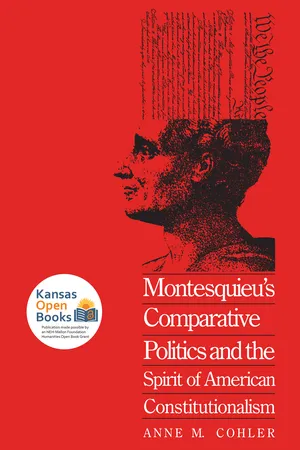
Montesquieu's Comparative Politics and the Spirit of American Constitutionalism
- 220 pages
- English
- ePUB (mobile friendly)
- Available on iOS & Android
Montesquieu's Comparative Politics and the Spirit of American Constitutionalism
About this book
“American republicans,” notes Forrest McDonald, “regarded selected doctrines of Montesquieu’s as being virtually on par with Holy Writ.” But exactly how the French jurist’s labyrinthian work, The Spirit of the Laws, with was published in 1748, influenced the eighteenth-century conception of the republic is not well understood by historians or theorists. Anne M. Cohler undertakes to show the importance of Montequieu’s teaching for modern legislation and for modern political prudence generally, with specific reference to his impact on The Federalist and Tocqueville. In so doing, she delineates Montequieu’s contribution to political philosophy and suggests new ways to think about the formation of the American Constitution.
To analyze the comparative politics found in the Spirit of the Laws, Cohler focuses on four fundamental principles underlying Montesquieu’s view of government: spirit, moderation, liberty, and legislation. In this endeavor she is guided by the conviction that the philosopher hews to the spirit of the laws rather than to the laws themselves—that is, to internal rather than external principles. Montesquieu, in Cohler’s argument, addresses the problem posed by the tendency to see human beings in light of universal abstractions at the expense of particular relationships, distinctions, and forms. To counter this tendency, which can be fostered by religion, Montesquieu develops a theory of prudence designed to support the world of politics and political life, necessarily an intermediate world occupying a space between universal abstractions and individual particularities.
Cohler suggest that the Federalists and Tocqueville were most influenced by this preoccupation with spirit and moderation. James Madison and other Federalists, for example, were not drawn to limited government as a principled notion but rather as a consequence of understanding the context within which a moderate government must act not to become despotic. Similarly, Tocqueville extols democracy as self-government as an antidote to the dangers of democracy as a rule; the character of the governed shapes the nature of the governors. These and other conclusions will prove valuable to intellectual historians, political theorists, and students of religion.
Open access edition funded by the National Endowment for Humanities and the Andrew W. Mellon Foundation Humanities Open Book Program.
Frequently asked questions
- Essential is ideal for learners and professionals who enjoy exploring a wide range of subjects. Access the Essential Library with 800,000+ trusted titles and best-sellers across business, personal growth, and the humanities. Includes unlimited reading time and Standard Read Aloud voice.
- Complete: Perfect for advanced learners and researchers needing full, unrestricted access. Unlock 1.4M+ books across hundreds of subjects, including academic and specialized titles. The Complete Plan also includes advanced features like Premium Read Aloud and Research Assistant.
Please note we cannot support devices running on iOS 13 and Android 7 or earlier. Learn more about using the app.
Information
Table of contents
- Front Cover
- Half Title
- Title Page
- Copyright Page
- Dedication
- Contents
- Kansas Open Books Foreword
- Acknowledgments
- 1 Introduction
- 2 Narrative
- 3 Spirit
- 4 Moderation
- 5 Liberty
- 6 Legislation
- 7 Moderate and Free Government: The United States Constitution
- 8 Tocqueville’s Democracy
- 9 Conclusion
- Notes
- Index
- Back Cover